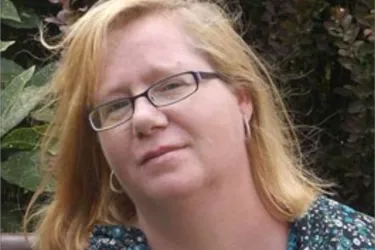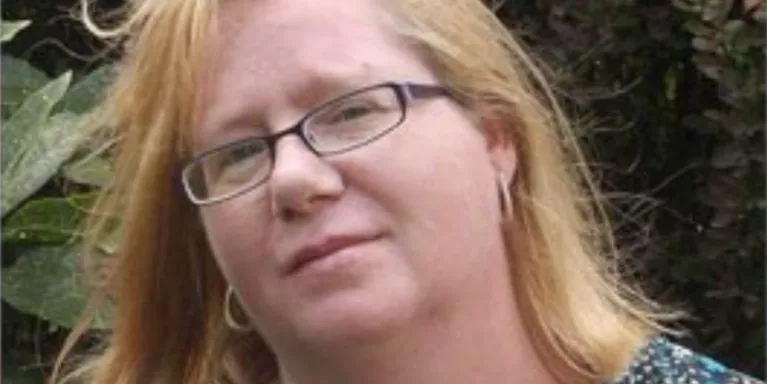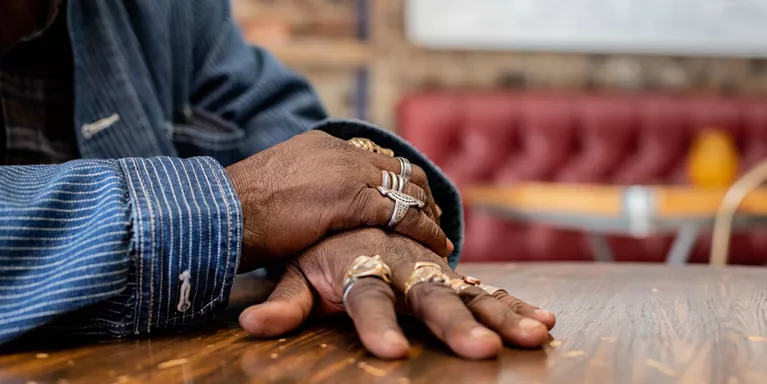Support not sanctions
Kerry blogs about being too unwell to work and needing support from the welfare system but being let down.
Kerry is a Postgraduate Counselling and Psychotherapy student, works for a homeless charity and runs the 'I am...' art project.
We’re asking whoever forms the next Government to make sure anyone with a mental health problem who requires it can access financial support from the welfare system, free from the fear of sanctions and having their benefits removed if they are too unwell to work. Being able to depend on a secure and stable income is hugely important. For many of us, money worries can significantly impact on our mental health and chances of recovery. This can be especially true if your income depends on the welfare system. Kerry blogs about needing support from the welfare system and being let down.
A little over six years ago I became homeless after experiencing abuse and rape within a flat share. I dropped out of university and lost my part-time job, which meant I had to rely on benefits to survive. As you might imagine, this affected my mental and physical health and, on top of my already diagnosed anxiety and depression, I started to experience symptoms of PTSD (post traumatic stress disorder).
Whenever I felt unsafe my brain would switch off and I became unresponsive leaving me incredibly vulnerable. I also suffered horrendous nightmares and flashbacks where it felt like I was experiencing the trauma all over again. It was terrifying and exhausting.
While still homeless and sofa surfing I endured a brief stay on a psychiatric ward after which I was placed in a bed and breakfast and then into temporary accommodation. During this time I was under the care of a home treatment team, I have no idea what I would have done without them. I was barely surviving but they supported me in applying for and attending meetings to receive benefits.
"I don't remember much about this process because at the time I was so unwell that I was only really capable of signing my name."
Seven months later I had a permanent address again. I was in a position where I could seek therapy – it took four years before specialist trauma therapy became available. I was trying to get better as fast as I possibly could with very limited means and resources. There was so much pressure coming from myself and others, and it was hard trying to live on £72 a week, but I set up my own arts-based community project as a way of finding my voice and building a support network.
About a year after moving into permanent accommodation and a few months of enjoying and successfully running my volunteer project, I thought I was ready to enter the world of employment and moved myself on to JSA (Jobseekers’ Allowance) from ESA (Employment and Support Allowance). This turned out to be mistake. The pressure to complete the tasks involved to receive the JSA alongside managing my PTSD symptoms was all too much. (Benefits FAQ)
I found myself in and out of hospital and frequently back under the care of the home treatment team. This meant I was unable to attend a number of my JSA appointments and despite having sick notes from my GP and letters from the home treatment team, I received my first benefit sanction. My benefits, my only source of income, were stopped for three and a half weeks.
I ended up £440 in rent arrears, being threatened with eviction and having no money to eat or pay bills. It was thanks to the support of a few wonderful friends that I was fed and had my bills paid. But I know this isn’t an option for many people who are sanctioned.
"Right now there are people sitting hungry, cold and not knowing where or who to turn to – their lives are at risk."
In recent years we've seen our TV screens overwhelmed with programmes such as 'Benefits Street', 'Benefits Britain' and 'Benefits by the Sea', spreading prejudice and suspicion towards people receiving benefits. I’ve experienced it myself. I’ve felt a negative attitude towards those of us who have either short or long-term illnesses, especially those of us with mental health difficulties.
There’s this idea that we must only sit around suffering and being miserable each and every day to qualify for our benefits. I have been falsely reported to the DWP for benefits fraud just because I dared to make the most of my life on the days I wasn’t in excruciating mental or physical pain. Like me, the majority of people being reported for fraud are innocent, but we’re the ones that suffer by being investigated, questioned, re-assessed and sometimes sanctioned without investigation. All things that can exacerbate or cause mental ill health.
ESA and PIP exist to support those of us experiencing illness and disability. It seems the government and a large number of people have forgotten this and would rather blame, punish and, in many cases, further victimise adults and children leaving them even more vulnerable.
This June, the UK goes to the polls. Mind’s 2017 General Election manifesto sets out mental health priorities and calls on the next government to:
- remove the threat of sanctions for people who cannot work because of a mental health problem so that people have the space they need to recover, free from inappropriate pressure.
- restore support under the Personal Independence Payment for people with mental health problems who need extra help to make journeys.
- reverse recent reductions to Employment and Support Allowance so that people who are unable to work because of a mental health problem have the support they need to stay well.
- deliver the current Government’s recent commitment to no further reductions to the financial support people with mental health problems receive through disability and incapacity benefits.
- reform the Work Capability Assessment so that people are accurately and honestly assessed, the real impact of individual health problems is understood, and assessments get it right the first time.

See what we're campaigning on

Our campaigns
We'll fight your corner. We believe everyone with a mental health problem should be able to access excellent care and services. We also believe you should be treated fairly, positively and with respect.
Share your story with others
Blogs and stories can show that people with mental health problems are cared about, understood and listened to. We can use it to challenge the status quo and change attitudes.

















